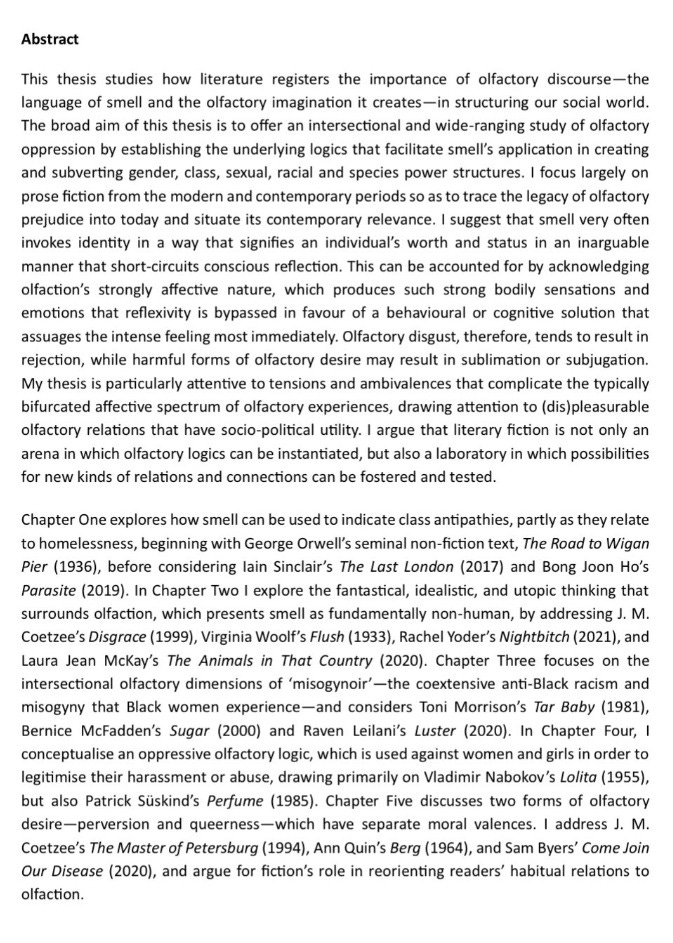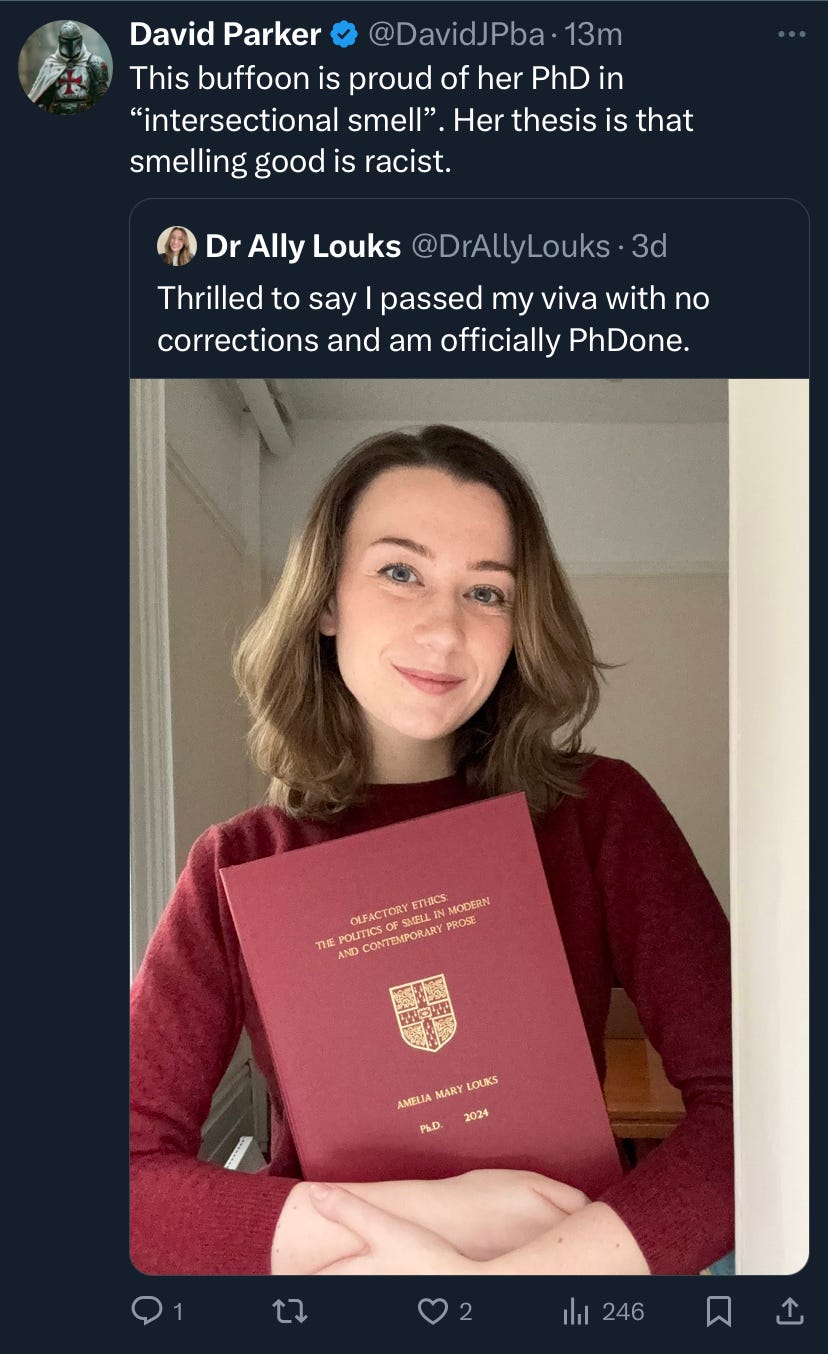In Defense Of Writing A Quirky Thesis On The Politics Of Smell In Modern Literature
Anti-intellectuals on Twitter are at it again
A few days ago, Cambridge grad student and newly minted Ph.D. Ally Louks tweeted a photo of her recently completed thesis on themes of smell in modern and contemporary literature.
The PDF is locked away so I can’t tell you much about it, but here’s the abstract she posted online:
As a soulless, non-fiction reading philistine (sorry,
), it’s well above my paygrade and a touch outside my wheelhouse. Still, it Louks pretty interesting to me!(Apologies.)
Naturally, the tweet went viral (it’s currently at 15 million impressions), and most of the feedback was... negative — a 50/50 split between generic misogyny and braindead anti-wokeness:
Pace the online mob, olfactory ethics is obviously an interesting subject! I’m not up on my modern and contemporary literature, so I can’t weigh in on that side of things. But I am into practical ethics, and a moment’s thought reveals that there are plenty of smellosophical questions worth asking:
Adjectives like ‘smelly’, ‘putrid’, and ‘foul-smelling’ aren’t morally neutral. They reek of malodorous value judgements (see: my essay on thick concepts), some of which are directed at entire people groups on the basis of race and class. Some stereotypes about smell are pretty benign (that White people smell like wet pennies, etc.), but some are more pernicious (e.g., the median racist joke about Indians). Within India itself, Bengali Muslims are often marked as ‘foul smelling’, which makes them easier to marginalize. Clearly, smell can be morally noxious, and there’s plenty of analysis worth doing.
In Patrick Süskind’s historical fantasy novel Perfume (I’ve read this one!), the main character, Grenouille, invents a perfume so potent that everyone who smells it loses their minds and wants to have sex with him. The main moral problem with this perfume is that Grenouille has to murder a bunch of women to get the key ingredient, but it seems like using Grenouille’s perfume as a means to getting laid would also be objectionable, since — like a love potion — it would problematically undermine consent. In the real world, some men and women wear pheromone perfumes, which are meant to arouse the people who smell them. Does wearing a pheromone perfume to a date trick, coerce, or problematically nudge the person you’re going on a date with into having sex with you, if that’s what they end up doing? Below some threshold, it seems fine to wear a perfume that will increase the odds of a date going well — presumably, any nice-smelling perfume should do that. Do pheromone perfumes fall below this threshold? A question worth thinking about!
Derek Parfit — the greatest ethicist of all time — apparently spent an hour a day brushing his teeth, since, he believed, toothbrushing time is time for reading Kant. This suggests a positive correlation between minty breath and being the greatest ethicist of all time. To establish causation, of course, further research is needed, but it’s easy to imagine that a stinky breath-having philosopher getting all up in your face about the Trolley Problem is going to be less persuasive than a Colgate-using Parfit-type with impeccable oral hygiene.
It’s true that ‘wokeness’ is very often bad, that many academics are rent-seekers, that PhDs are overproduced, etc. But not every use of the word ‘intersectional’ heralds a Marxist takeover. ‘Intersectionality’ is a self-evidently useful concept; it helps us describe certain social phenomena that would be harder to describe without it. This is good.
The grievance studies affair showed that ridiculous non-contributions can get past peer-review, simply by being left-coded. But not all left-coded work that passes peer-review is a ridiculous non-contribution. Scholars of English literature study themes in English literature. Smell is a theme in English literature. Ally Louks studied it.
It’s fine not to understand the project — I don’t, and that’s okay! I am not an expert in English Literature.
EDIT: It feels intellectually dishonest not to include this one meme that some guy made, because it did make me laugh against my will. That and
’s quote-tweet were probably the only two funny responses.












The general topic - how someone smells and how that relates to class, etc is interesting. The direction of her thesis isn’t interesting to me, but how strange that so many people are so offended that they take the time to write the diatribes they write. As in…don’t they have something better to do with their time and emotional capacity?
Couldn’t disagree more. This is at the bottom of a fraction of a percent of interesting levels. I have almost the exact opposite intuition and find it obvious, and I’m surprised you disagree.
Of all problems regarding racism, it probably ranks in the bottom of everything, and the way that some pieces of literature have used stereotypes about smell (that I was mostly only vaguely aware of in the first place) is almost irrelevant to modern problems. If police shootings of unarmed black people aren’t a statistical problem and Implicit Association Tests aren’t valid, why should we expect smell to matter or even be worth studying? Let alone what some past smell stereotypes have to do with today. Maybe in some other countries it could matter or something, but this isn’t just about those specific cases.
It’s a waste of money and time to study such subjects. I think philosophers spend too much time on history of philosophy, but that’s far more valuable than this!
Intersectionality is also silly nonsense that justifies other silliness like standpoint epistemology, but this comment is already long enough.